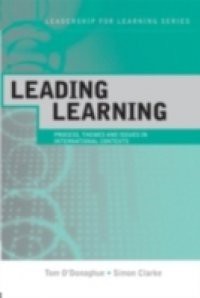The notion that school transformation is dependent on exceptional leaders is increasingly seen as unrealistic and unsustainable. Instead, the idea of distributed leadership, which promotes the view that all stakeholders have complementary leadership roles to play in enhancing student learning, is now being promoted as a more useful framework for understanding schools and how they might be changed. Subscribing to the notion of distributed leadership, O'Donoghue and Clarke identify two key groups: the 'leaders of learning' and the 'leaders for learning'. The leaders of learning - and the focus of this book - are those working at the school level to improve the quality of learning in the classroom, such as teachers, principals, pupils and involved members of the local school community. The leaders for learning are the policy-makers and administrators whose support is crucial. The authors argue that in order to be effective leaders, both groups require an understanding of: Broad trends in contemporary leadership theory Recent views on learning theory The importance of teachers engaging continually in learning about their practice The significance of creating and sustaining schools as learning organisations Forging links between leadership and learning The book's examination of the shifting approaches to leading learning in contemporary schools is enriched by innovative examples drawn from a range of international contexts. Leading Learning will appeal to students involved in Masters and Doctoral courses relevant to the field and those undertaking programmes of school leadership preparation and development. It will also be of interest to academics working in the field of educational leadership and management.

